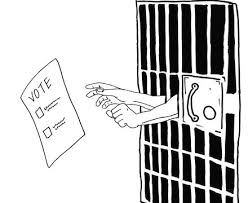
(Illustration by Juli Badics)
By: William Blount, Samuel Jackman, and Simon Shalett
According to the Prison Policy Initiative, In Louisiana, the incarceration rate is 1,067 per 100,0000 people. The average incarceration rate in the United States is 614 per 100,000 people. Louisiana’s former changes in voting laws provide formerly incarcerated individuals the chance to vote again, which could gradually shape local and state legislation. While the immediate effects on local and state legislation remain prevalent, changes in voter access and participation are important steps toward greater inclusivity in the democratic process.
Historically, Louisiana’s restrictive policy excludes a substantial number of individuals with felony convictions, contributing to ongoing political and social exclusion. The right to vote is fundamental to civic engagement, and denying this right affects not only the individuals but also the overall representativeness in the democratic process. Recent legislative efforts, such as enacting Act 636 in 2019, which restored voting rights to individuals on probation or parole after five years, mark notable steps toward inclusivity.
Nationally, approximately 5.2 million Americans remain disenfranchised due to felony convictions, with approximately 108,000 affected in Louisiana as of 2016. Following the implementation of Act 636, several thousand formerly incarcerated individuals in Louisiana have regained the right to vote. Despite this progress, turnout rates among this group continue to vary, and the total influence on legislative outcomes is yet to be determined. Legislative changes such as these are essential as they directly influence voter turnout and, consequently, the legislative priorities at local and state levels. Empowering formerly incarcerated individuals to vote has the potential to impact legislative agendas, especially in areas heavily affected by incarceration.
Significant legislation have enhanced voting rights for ex-incarcerated individuals in Louisiana. Act 636 (2019) allows individuals on probation or parole for at least five years to regain voting rights. HB 265 (2020) simplified the voter registration process for these individuals and mandated that probation and parole officers inform them of their voting rights. Additionally, HB 218 (2021) expanded eligibility for voter registration to include individuals still on parole under certain conditions. These legislative measures reflect ongoing efforts to remove barriers and promote voter participation among formerly incarcerated citizens.
Louisiana’s legislature has fluctuated between supporting ex-convict’s re-entry into citizenship and restricting their right to vote and prosper. Unlike Norway, the United States prison system does not allow inmates to vote from state and federal prisons. Former Governor Bel Edwards allowed for a massive increase in voting access among ex-convicts by adding House Bill 265 in 2019, ensuring that people on parole or probation for five years have the right to vote.

(Goodman, 2018)

(Scheinuk, 2024)
Landry’s recent legislation has significantly reduced democratic participation among local citizens. In 2010, the total count of disfranchised people in America reached fifteen million, representing an increase of 12.4 million from former counts. This rise exposes a growing trend of disfranchisement. Indeed, as Fellner and Mauer indicate in their report for The Sentencing Project, one in fifty adults have currently or permanently lost the ability to vote due to a felony conviction. That represents about 2% of the adult population, a substantial proportion of potential voters. However, the impact among black voters is far greater. According to the report, 1.4 million black men have lost their voting rights—13 percent of adult Black men. This disproportionate impact underlines more significant systemic issues within the criminal justice system and their compounding problems with voting rights.
The disenfranchisement of this number of African American men raises concern against the historical backdrop of racial discrimination in the United States. The fact that more than one-third of the total disenfranchised, 36 percent, are Black suggests an imbalance in how these laws bear on and affect different communities. This data points to deeper racial biases underlying the legal and electoral regimes. In its report, the Sentencing Project lends credence to demands for reforms to rectify these inequalities and ensure voting rights protection for all citizens, irrespective of any previous criminal history.
Such voting restrictions undermine the democratic principle of universal suffrage. Millions of citizens’ exclusion from this process reduces individual voices and weakens the country’s democratic fiber. Attention to the matter needs comprehensive policy changes, with respect for the right to vote as fundamental for each citizen. Organizations such as VOTE (Voices of the Experienced) have worked to help rehabilitate ex-convicts while promoting political candidates who support their rights. Change continues to be advantageous to the voting system; VOTE and other organizations continue to work to preserve democracy throughout the state of Louisiana.
This piece is part of an on-going series from professor Betsy Weiss’s Young Public Scholars Pre-College class, “Punishment and Redemption in the Prison Industrial Complex,” which is taught at Tulane University.
 NOLAbeings
Multimedia artist Claire Bangser created NOLAbeings as a portrait-based story project that marries...
NOLAbeings
Multimedia artist Claire Bangser created NOLAbeings as a portrait-based story project that marries...
 Data corner: Adobe Suite (create a PDF, social media graphic, presentation, edit a photo and video
Data corner is where you go to work with analytics and top tech skills. It takes on everything from PERL and SQL to Canva and Sprout Social.
Data corner: Adobe Suite (create a PDF, social media graphic, presentation, edit a photo and video
Data corner is where you go to work with analytics and top tech skills. It takes on everything from PERL and SQL to Canva and Sprout Social.
